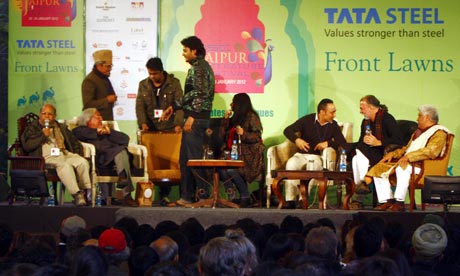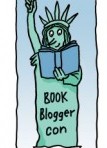
The debate after the videolink with Salman Rushdie was cancelled. Photograph: Getty Images/Himanshu Vyas/Hindustan Times
On Tuesday afternoon this week I was faced with one of the most difficult decisions I have ever had to make.
It was the last afternoon of the
Jaipur Literature Festival, of which I am co-director, and more than 10,000 people were milling around the grounds of Diggi Palace, the festival venue, eagerly waiting to hear
Salman Rushdie speak by video link from London. For three weeks we had waited anxiously for this moment, ever since
Maulana Abdul Qasim Nomani of the Deoband madrasa had called for the Indian Muslim community to oppose Rushdie's visit to our festival. For those three weeks we had been negotiating with various government agencies, the police, a spectrum of intelligence agencies and local Muslim groups to try to make sure that Rushdie could still be heard. Despite a great deal of pressure, we had kept our invitation open and had refused to back down from our position that Rushdie had every right to return to the country of his birth and to discuss his work.
Then at about one o'clock a large number of Muslim activists appeared in the property and gravitated to the back of the lawns where a huge crowd had gathered to hear the videolink. Some of them went into the central courtyard of the palace to make their
namaz (pray), and according to some reports, the maulana in charge told his followers that if anyone was killed that day they would die a martyr. Then they sought out our producer, Sanjoy Roy, and told him that they were prepared to use any amount of violence in order to stop Rushdie's voice being heard. Others talked to the press: one told a reporter from the Times of India that
"rivers of blood will flow here if they show Rushdie", while the Muslim Manch representative Abdul Salim Sankhla was quoted as saying: "We will not allow Rushdie to speak here in any form. There will be violent protests if he speaks." While all this was happening, some of the other activists were turfing school children out of their seats and intimidating festival guests.
The videolink was due to start at 3.45pm. At three o'clock, as Rushdie was already on his way to the television studio, as crowds were gathering, and as the number of activists/thugs was increasing alarmingly, Sanjoy, my co-director, the author
Namita Gokhale and I were called to the security control room by the Jaipur commissioner of police. He had more bad news for us. As well as the activists gathering inside the festival venue, hundreds of protesters were now massing threateningly in the municipal gardens just outside. He was quite clear: the videolink could go ahead, they had the resources to make sure it wasn't interrupted, but "there would be violence in the venue and worse outside" if we didn't call it off. We asked what exactly this meant. He said that his officers had asked if they could use force, and that they were expecting "serious trouble". What might this entail?
Lathi (truncheon) charges and police shooting? It was a possibility, he said.
What do you do in this situation? The crowd is getting restless, more and more protesters are entering the property, Rushdie is now sitting in the studio in London waiting to speak and
Barkha Dutt, the gutsy Indian television host who is to interview him, is all set to begin. You have three to five minutes, maximum, to make a decision. If you give in to the intimidation, you put at risk all the principles upon which literary life is based: what is the point of having a literary festival, a celebration of words and ideas, if you censor yourself and suppress an author's voice? But equally, can you justify going ahead with a literary event, however important, if you know that you will thereby be putting at risk the lives of everyone who attends – including the authors who have come at your invitation and hundreds of school children and elderly people – as well as knowingly igniting a major religious riot in one of the most crowded towns in northern India with a long tradition of tensions between different communities?
That tradition of tension lay in part behind the problems we were now facing. In 2007, when literary events in Jaipur were still in their infancy, Rushdie was our first big international star, and his presence at the festival was a milestone for us. It raised our profile beyond anything we could have hoped or imagined. Rushdie came unannounced, with no bodyguards or police protection, and spoke brilliantly, sitting drinking tea and signing books for his fans, while giving avuncular advice to younger writers who had never met a writer of his stature. No objections were raised, no politicians got involved, no problems arose.
This time, however, the political situation in India is much more volatile. The 2012 festival happened to coincide with a
razor-edge election in the all-important north Indian state of Uttar Pradesh, a poll in which the vote of the Muslim community was deemed to be crucial. It also came only four months after the Rajasthan government found itself in trouble with its Muslim voters after the Rajasthan police fired on a crowd of angry Muslim protesters at Gopalgarh, an hour's drive east of Jaipur, killing 10 people.
All this meant that when, at Rushdie's request, we announced his name on our website, and when
Maulana Nomani of Deoband then called for Rushdie to be banned from India, not a single Indian politician was willing to state clearly and unequivocally that he was welcome in the country in which he was born, which he loved, which he had celebrated in his fiction and to whose literature he had made such a ground-breaking contribution.
Full story at The Guardian.























 The social network
The social network 


















